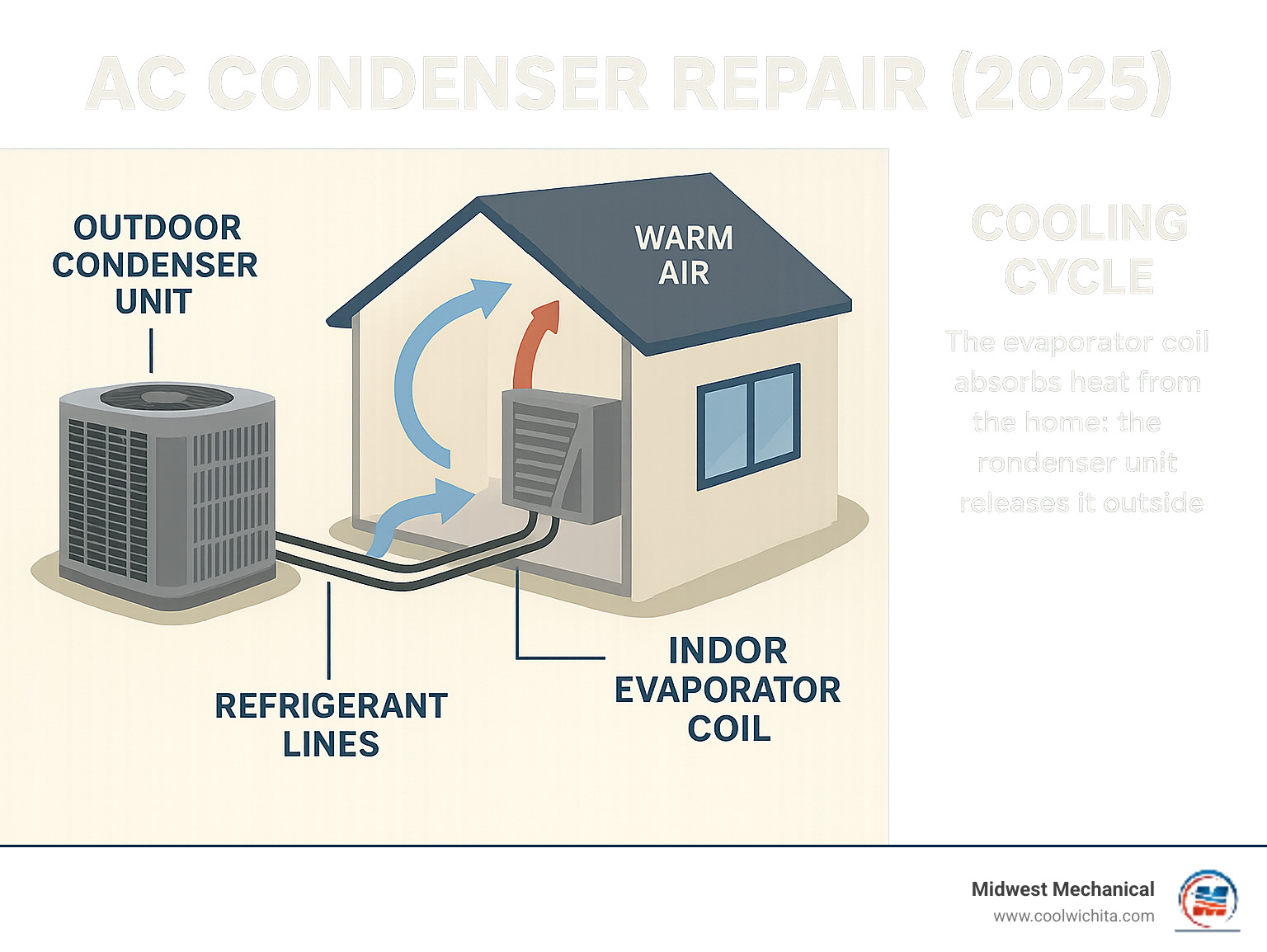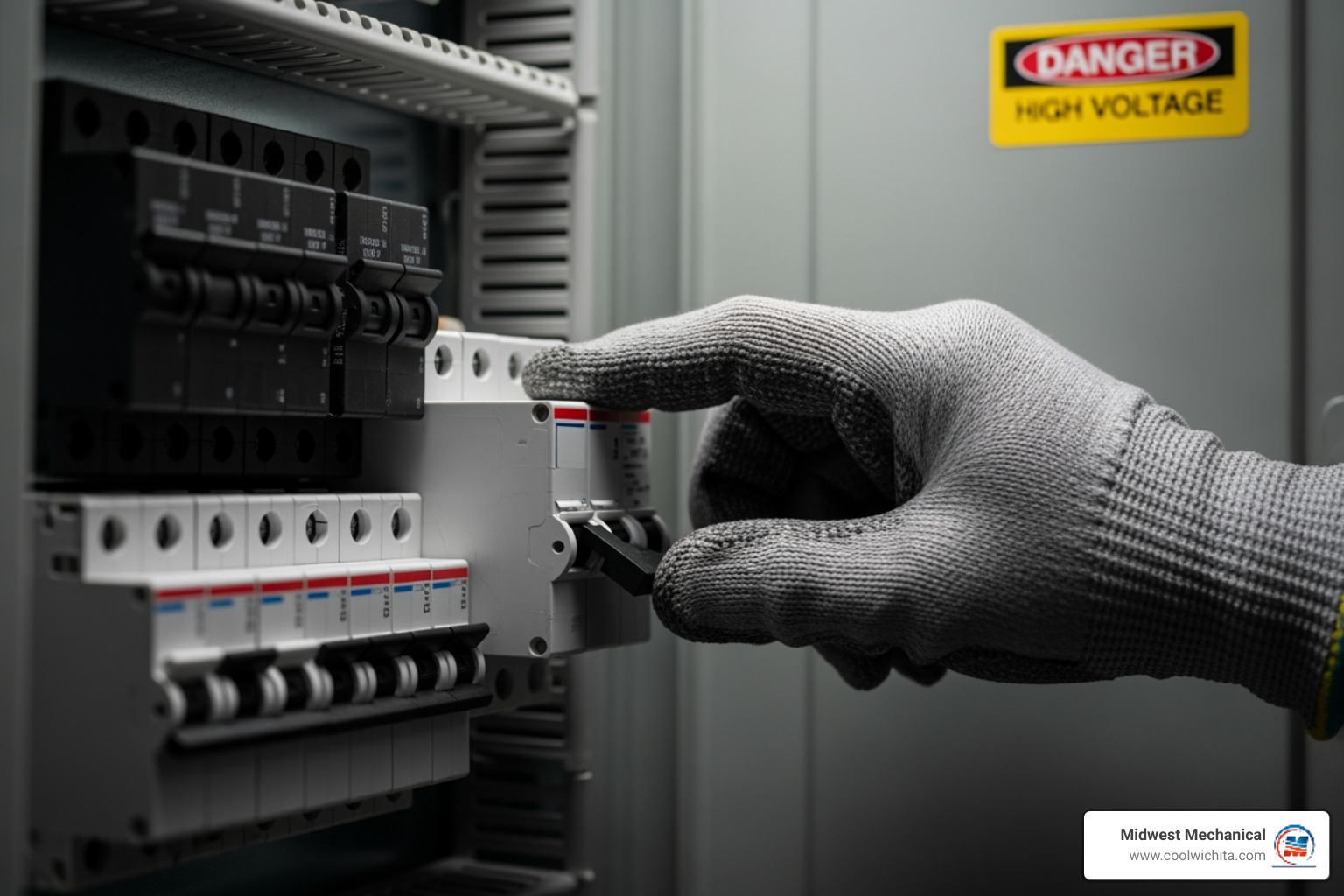When Your Central Air Conditioner Stops Keeping You Cool
AC condenser repair becomes urgent when your cooling system starts blowing warm air on a sweltering Wichita summer day. The good news? Many common condenser issues can be diagnosed and some even fixed by homeowners before calling in the professionals.
Quick AC Condenser Repair Guide:
- Check power supply - Verify breaker hasn't tripped and unit is receiving power
- Clean condenser coils - Remove debris and dirt buildup with garden hose
- Replace air filter - Clogged filters reduce airflow and strain the system
- Inspect capacitor - Look for bulging or leaking in this small cylindrical component
- Clear vegetation - Ensure 2+ feet clearance around outdoor unit
- Listen for unusual sounds - Grinding, squealing, or banging indicates mechanical problems
Your AC condenser is the outdoor unit that releases heat absorbed from inside your home. When it fails, your entire cooling system stops working effectively. Common problems include dirty coils, failed capacitors, refrigerant leaks, and electrical issues.
The research shows that condenser repairs typically range from simple maintenance tasks to complex component replacements. While homeowners can handle basic cleaning and troubleshooting, electrical work and refrigerant handling require professional expertise.
Understanding when to attempt DIY fixes versus calling Midwest Mechanical can save you both time and money while keeping your family comfortable during Kansas heat waves.

What is an AC Condenser and Why Does It Fail?
Picture this: it's a scorching July afternoon in Wichita, and you walk into your home expecting that blessed cool air to wash over you. Instead, you're greeted by what feels like a sauna. When your AC condenser repair becomes necessary, understanding what went wrong can help you get back to comfort faster.

Your AC condenser is that big metal box sitting outside your house – you know, the one that hums quietly while you enjoy cool indoor temperatures. Think of it as your home's heat bouncer, kicking unwanted warmth to the curb. This outdoor unit works hand-in-hand with your indoor components to create the magical cooling cycle that keeps Kansas summers bearable.
Here's how the magic happens: special refrigerant fluid travels through your system like a heat-absorbing superhero. Inside your home, it soaks up all that hot, sticky air. Then it travels outside to the condenser, where the compressor squeezes it back into liquid form while the fan and condenser coils release all that captured heat into the great outdoors. It's a beautiful dance of physics that keeps you comfortable. For more details on this process, check out how central air conditioners work.
But like any hardworking hero, your condenser faces some serious challenges that can lead to failure. Debris buildup tops the list of troublemakers. Your outdoor unit is basically a magnet for everything Mother Nature can throw at it – leaves, grass clippings, dirt, and even the occasional wayward tennis ball. When this stuff accumulates on the condenser coils, it's like wrapping your unit in a thick winter coat during summer.
Electrical issues are another common villain in the condenser story. Components like capacitors and fan motors work overtime in extreme heat, and they can burn out or fail over time. Wear and tear from constant cycling, power surges, and age eventually takes its toll on these hardworking parts.
Then there are refrigerant leaks – perhaps the most serious concern. Your AC doesn't "use up" refrigerant like gas in your car. If levels are low, you've got a leak somewhere, possibly in the condenser coils themselves. Corrosion, punctures, or worn seals can cause these leaks, and ignoring them can spell disaster for your expensive compressor.
Telltale Signs Your Condenser Needs Attention
Your home has a way of telling you when something's not right with your cooling system. Learning to recognize these warning signs can save you from sweltering through a Kansas heat wave.
Reduced cooling is usually the first red flag. When your AC runs constantly but your house feels more like a greenhouse than a sanctuary, your condenser might be struggling to do its job. You might notice certain rooms staying warm or your system taking forever to reach the temperature you've set.
Strange noises coming from your outdoor unit deserve immediate attention. A healthy condenser hums quietly, but when you hear buzzing, hissing, banging, or grinding, trouble is brewing. Hissing often signals a refrigerant leak, while grinding or banging sounds usually mean mechanical parts are failing.
Leaking fluid around your outdoor unit is another serious warning sign. While a little condensation is normal, puddles of water or oily-looking refrigerant indicate problems that need professional attention.
Sometimes your unit won't turn on at all, or it starts up briefly then shuts down again – a problem called frequent cycling. This frustrating issue often points to electrical problems, overheating, or a failing capacitor.
Frozen coils might seem impossible in summer heat, but they're actually a sign of serious trouble. When you see ice on the refrigerant lines near your condenser, it usually means low refrigerant levels or blocked airflow – both problems that stress your entire system.
How a Faulty Condenser Impacts Your Home
When your condenser starts failing, the effects ripple through your entire home like stones thrown in a pond. Your energy efficiency takes the first hit – a struggling condenser has to work much harder to move heat, consuming more electricity and driving up your utility bills faster than you can say "summer heat wave."
Your cooling performance suffers dramatically too. Even if your system runs constantly, you'll notice hot spots in certain rooms, higher humidity levels, and that general feeling that your AC just isn't keeping up. It's like trying to cool your house with a hairdryer – lots of effort, disappointing results.
The system strain created by a failing condenser puts extra pressure on other expensive components, especially your compressor. When the condenser can't release heat properly, your compressor works overtime trying to compensate. This can lead to premature failure of one of your system's most costly parts.
Finally, poor cooling performance can indirectly affect your indoor air quality. An efficient AC system removes humidity along with heat, creating an environment where mold and mildew struggle to grow. When your condenser fails and humidity levels rise, you might notice musty odors or even moisture problems that extend far beyond just feeling warm.
The good news? Recognizing these problems early and addressing them promptly can prevent minor issues from becoming major headaches – and major expenses.
A Homeowner's Guide to AC Condenser Repair and Maintenance
Taking care of your AC condenser doesn't require an engineering degree, but it does require respect for safety and knowing your limits. Think of it like maintaining your car – you can check the oil and change a tire, but you probably wouldn't rebuild the engine in your driveway.
The most important rule? Always turn off the power to your AC system at the circuit breaker before doing any work on your condenser unit. We've seen too many close calls from folks who skipped this step. It's not just about flipping the switch on the unit itself – you need to cut power at the breaker box.

Once you've safely shut off the power, you can tackle some basic troubleshooting and maintenance that might save you a service call. But remember – if you're not comfortable with any step, there's no shame in calling the professionals at Midwest Mechanical.
Simple DIY Troubleshooting and Maintenance Steps
Before you assume your condenser needs major repairs, let's walk through some simple checks that solve problems more often than you'd think.
Start with your thermostat settings. It sounds almost silly, but we've made plenty of service calls where someone accidentally switched the thermostat to "heat" or the batteries died. Make sure it's set to "cool" and the temperature is actually below your current room temperature.
Next, check your air filter. A clogged filter is like trying to breathe through a pillow – your entire system struggles, including the condenser. If you can't remember the last time you changed it, that's probably your problem right there. During peak cooling season, filters should be changed every month or two.
Now let's head outside to your condenser unit. Clear away debris that's accumulated around and on the unit. We've pulled everything from tennis balls to entire bird nests out of condensers! Trim back any vegetation so there's at least two feet of clear space all around the unit. Your condenser needs to breathe.

For cleaning the condenser coils, grab your garden hose and gently spray from the inside of the unit outward. This pushes dirt and debris away from the delicate fins rather than deeper into them. Be gentle – those aluminum fins bend easily and are expensive to repair.
After you've cleaned everything up, restore power and listen carefully. If you hear the compressor humming but the fan isn't spinning, you likely have a capacitor or fan motor problem that needs professional attention.
Common Methods for AC Condenser Repair
While basic maintenance can prevent many problems, some AC condenser repair issues require professional expertise and specialized tools.
Capacitor problems are incredibly common, especially in older units. The capacitor is like a battery that gives your fan motor and compressor the electrical boost they need to start up. When capacitors fail, you might hear clicking sounds or see the compressor trying to start but failing. These small cylindrical components can bulge, leak, or simply wear out over time. While replacing one might look straightforward, capacitors store dangerous electrical charges even when power is off.
Fan motor issues show up as grinding noises, wobbling blades, or a fan that won't spin at all. Sometimes it's just worn bearings, other times the entire motor needs replacement. Our technicians can quickly diagnose whether it's worth repairing or if replacement makes more sense.
Refrigerant leaks are serious business. Your AC system is a closed loop – if refrigerant levels are low, there's definitely a leak somewhere. These leaks often occur in the condenser coils due to corrosion or physical damage. Finding these leaks requires specialized detection equipment, and repairing them involves brazing or patching techniques that require certification to handle refrigerants safely.
Electrical problems go beyond simple capacitor issues. Modern condensers have control boards, contactors, and wiring that can fail due to power surges, age, or weather damage. Diagnosing these problems requires understanding HVAC electrical systems and having the right testing equipment.
The risks of DIY repair on complex issues are significant. Beyond the obvious danger of electrical shock, there's the risk of refrigerant exposure, which can cause frostbite or worse. More commonly, well-meaning homeowners can cause expensive damage to their systems or void their warranties by attempting repairs beyond their skill level. What starts as a simple fix can quickly become a major replacement if things go wrong.
Repair vs. Replacement: Making the Smart Financial Choice
Nobody enjoys facing a major AC condenser repair decision, especially when the summer heat is bearing down on your Wichita home. The truth is, this choice can feel overwhelming – but it doesn't have to be. We've helped countless homeowners steer this exact situation, and we're here to break it down for you in simple terms.
The decision between repairing and replacing your AC condenser comes down to a few key factors: the age of your system, the cost of repairs, your unit's current efficiency, and how much life it has left. Think of it like deciding whether to fix an old car or buy a new one – sometimes a tune-up is all you need, but other times it's smarter to invest in something reliable for the long haul.
| Feature | Repair | Replacement |
|---|---|---|
| Cost | Generally lower upfront | Higher upfront |
| Age of Unit | Ideal for newer systems (under 10 years) | Recommended for older systems (10+ years) |
| Efficiency | Maintains current efficiency (which may be low if old) | Significantly improved efficiency with new unit |
| Warranty | May be covered if original issue is within warranty period | Comes with a new manufacturer's warranty |
| Long-term Value | Temporary fix, may lead to more repairs | Long-term solution, increased home value |
When to Repair Your AC Condenser
Sometimes the answer is crystal clear – repair is absolutely the way to go. If you're dealing with minor issues like dirty condenser coils, a blown capacitor, or damaged fan blades, these are typically quick fixes that won't break the bank. We've seen homeowners panic over what turns out to be a simple capacitor replacement that costs a fraction of a new system.
Newer systems – those under 10 years old – are almost always worth repairing. Your unit likely has plenty of good years ahead of it, and fixing one component can restore it to peak performance. It's like having a relatively new car with a flat tire – you wouldn't buy a new car, you'd just fix the tire!
The repair cost itself is a huge factor. If your AC condenser repair estimate is significantly lower than replacement costs, and your system isn't ancient, repairs make perfect sense. A faulty contactor or capacitor replacement is a smart investment when your system is otherwise healthy.
Understanding the Costs of AC Condenser Repair vs. Replacement
We wish we could give you exact numbers, but AC condenser repair and replacement costs vary based on several important factors. Understanding these elements helps you make sense of any estimate you receive.
Unit size plays a major role in pricing. Your home's cooling needs determine whether you need a 2-ton unit or a 4-ton system, and larger units naturally cost more. The brand and SEER rating also impact costs – higher-efficiency units with better SEER ratings cost more upfront but can save you serious money on energy bills over time.
Labor costs depend on the complexity of the job and how long it takes our skilled technicians to complete the work. Refrigerant type is another consideration, especially if you have an older system using R-22 refrigerant, which is being phased out and has become expensive.
Here's a helpful guideline we share with homeowners: the $5,000 rule. Take your system's age in years and multiply it by the repair cost. If that number exceeds $5,000, replacement often makes more financial sense. For example, if your 15-year-old system needs a $500 repair, that's 15 × $500 = $7,500, suggesting replacement might be the smarter long-term choice.
Benefits of Replacing an Older Condenser
Sometimes saying goodbye to your old condenser is exactly what your home and wallet need. Improved energy efficiency is often the biggest game-changer. Today's AC units are dramatically more efficient than models from even a decade ago. We're talking about potential energy savings of 20-30% or more compared to older systems.
Those lower energy bills add up quickly, especially during Kansas summers when your AC works overtime. The monthly savings can help offset the cost of your new system over time. Increased home comfort is another major benefit – newer systems provide more consistent temperatures, better humidity control, and quieter operation.
A new warranty gives you peace of mind that major component failures are covered for years to come. No more crossing your fingers and hoping your aging system makes it through another summer! Improved reliability means fewer emergency service calls and less stress when the temperature soars.
Don't overlook the potential for increased home value either. A new, efficient HVAC system is a strong selling point that shows potential buyers your home is well-maintained and will have lower operating costs. For more information about the benefits of efficient air conditioning systems, check out this helpful resource on benefits of an efficient air conditioner.
The bottom line? Every situation is unique, and that's why we always provide honest, personalized recommendations based on your specific system and circumstances.
Frequently Asked Questions about AC Condenser Issues
Over the years, we've chatted with countless homeowners about their AC condenser repair concerns. Some questions come up so often that we thought it would be helpful to share our answers with you. Whether you're dealing with a sudden breakdown or just planning ahead, these insights should help clear the air (pun intended!).
How long does an AC condenser typically last?
Here's the honest truth: most AC condensers will serve you faithfully for about 12 to 15 years on average. However, we've seen some well-maintained units push closer to 20 years, while others start showing their age around the 10-year mark.
The lifespan really depends on how well you treat your system. Regular maintenance is like giving your condenser a spa day – it keeps everything running smoothly and can add years to its life. We can't stress enough how much difference annual tune-ups make. Units that get professional attention consistently tend to outlast those that are ignored until something breaks.
Your local climate factors play a big role too. Here in Kansas, our condensers work overtime during those scorching summer months. The constant stop-and-start cycles during peak season can wear components down faster than in milder climates. It's just the reality of living somewhere with real seasons!
High-efficiency models often have the advantage of better-built components and more advanced technology. While they cost more upfront, these units are typically engineered to handle the demands of daily use better than basic models.
Can I replace just the condenser unit, or do I need a whole new AC system?
This is probably the question we get asked most often, and the answer is: it depends. You can replace just the outdoor condenser, but whether you should is a whole different conversation.
The biggest concern is system matching. Your new condenser needs to be perfectly sized and compatible with your existing indoor coil. Think of it like trying to dance with a new partner – if you're not in sync, things get messy fast. Mismatched components work harder than they should, break down more often, and waste energy.
SEER rating compatibility is another crucial factor. If you install a shiny new high-efficiency condenser but keep an old indoor coil, you won't get the energy savings you're paying for. It's like putting a race car engine in an old pickup truck – you're not getting the full benefit.
Here's where things get really important: refrigerant types. If your current system uses R-22 (the old Freon), you absolutely cannot just slap a new R-410A condenser onto it. These refrigerants are completely incompatible – it would be like trying to run a diesel engine on regular gasoline. In this case, replacing the entire system isn't just recommended, it's required.
Don't forget about warranty implications either. Many manufacturers require matched systems to honor their warranties. Mix and match at your own risk!
Our professional recommendation? Have one of our experienced technicians evaluate your specific situation. Sometimes replacing just the condenser makes perfect sense. Other times, investing in a complete system replacement saves you money and headaches in the long run.
What are the biggest risks of attempting a DIY AC condenser repair?
We love a good DIY project as much as anyone, but AC condenser repair isn't the place to test your handyman skills. The risks are just too serious to ignore.
Electrical shock tops our list of concerns. Your outdoor unit runs on 220-volt current – that's enough to seriously hurt or kill you. Even with the breaker off, capacitors can store dangerous electrical charges. We've seen too many close calls from well-meaning homeowners who thought they could handle it.
Refrigerant exposure is another major hazard. This stuff can cause chemical burns, frostbite, and serious breathing problems. Plus, releasing refrigerant into the air is illegal and harms the environment. You need EPA certification to handle it legally – there's a reason for those regulations.
Then there's the risk of further system damage. We've had customers call us after a DIY repair attempt went wrong, and unfortunately, what started as a simple fix often becomes a much more expensive problem. Your compressor alone can cost thousands to replace.
Voiding your warranty is almost guaranteed if you attempt repairs yourself. Most manufacturers require certified technicians to do the work, and they're not shy about denying warranty claims for DIY disasters.
Finally, proper AC condenser repair requires specialized tools that most homeowners don't have – manifold gauges, vacuum pumps, refrigerant recovery equipment, and more. Without the right tools, you're essentially trying to perform surgery with a butter knife.
We get it – calling a professional costs money. But trust us, the risks of going it alone far outweigh the savings. Your safety and your AC system's longevity are worth the investment in expert care.
Your Next Step for a Cool and Comfortable Home
When your AC condenser repair needs arise, you don't have to face them alone. We know how quickly a malfunctioning condenser can turn your peaceful home into an uncomfortable sauna, especially during those brutal Kansas summers we all know too well.
While we're thrilled that this guide has given you the confidence to handle basic troubleshooting and maintenance, we also want you to recognize when it's time to bring in the professionals. Some problems simply require the expertise, specialized tools, and safety knowledge that only certified HVAC technicians possess.
At Midwest Mechanical, we've been keeping Wichita families cool and comfortable for years. We understand the unique challenges our local climate presents – from sudden summer heat waves to those surprisingly warm spring days that catch everyone off guard. Our team of expert technicians knows exactly how to diagnose condenser issues quickly and provide the expert repair services your system needs to get back to peak performance.
We believe in combining traditional service values with state-of-the-art systems and technology. That means you get honest, transparent pricing without any surprise fees, comprehensive maintenance plans that prevent future breakdowns, and the peace of mind that comes with working with a local company that truly cares about your comfort.
Whether you're dealing with a professional diagnosis need, require immediate repair services, or want to discuss long-term solutions for your cooling system, we're here to help. Don't let a faulty condenser leave you sweating through another Kansas summer – your family deserves better than that.
Ready to get your home back to the cool, comfortable haven it should be? We're just a phone call away, ready to provide the reliable service and expert solutions you need.
Customer Testimonials
Hear from satisfied customers who trust us for reliable HVAC and plumbing service across Wichita.






Plus, the technician, Lee was very professional, knowledgeable and informative.
We will definitely be doing business with them sometime again in the past.


I'm prompt to my appointment. Thank you Midwest Mechanical.









We have partnered with GoodLeap to offer flexible payment options for your project. GoodLeap uses a soft credit check until funding and the highest score from all 3 bureaus to see if you qualify. It also takes just a few minutes to get started.




Service Areas
.svg)



